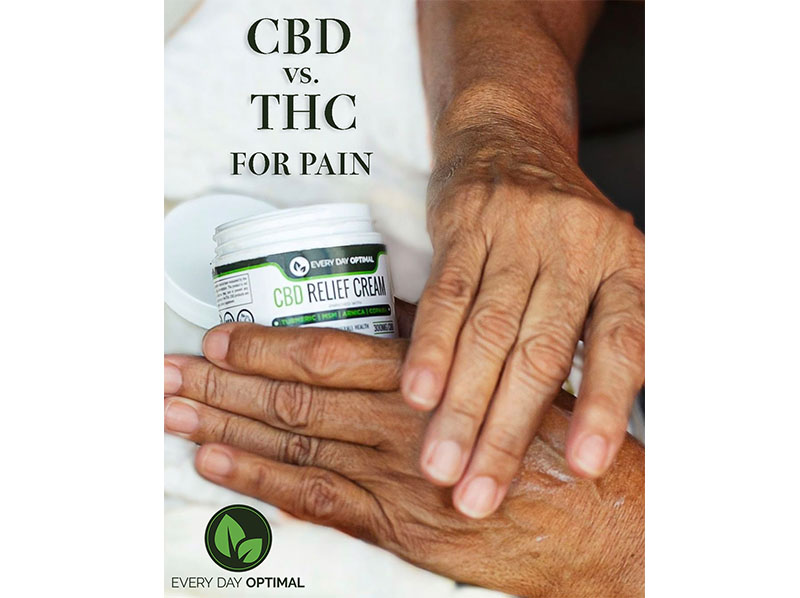Blog
CBD vs. THC for Pain: Which One Works Best?
When it comes to natural pain relief options, cannabis (and cannabis-derived products) are a top choice, and it’s not hard to see why. Whether you’re treating back pain, chronic migraine, muscle aches, nerve pain, digestive pain, or an old sports injury, cannabinoid products are safe, powerful options to alleviate your symptoms so you can get on with your day.
But if you’re trying to decide between medical marijuana strains or CBD products, it can be hard to figure out which one will work best for you. If you’re wondering about CBD vs THC for pain, keep reading to find out everything you need to know.
See our full article on the difference between CBD and THC written by Dr. Victor Chou- CBD vs THC: Health Benefits, Dosage, Side-Effects, Legal Status and More
What’s the difference between CBD and THC?
Both CBD (cannabidiol) and THC (tetrahydrocannabinol) are cannabinoids; that is, they’re both compounds extracted from cannabis that interact with the body’s endocannabinoid system. The endocannabinoid system refers to receptors found all over the body that regulate processes such as sleep, mood, digestion, and pain.
Cannabinoids like CBD and THC bind to these receptors, which is why they’re beneficial for so many different issues, like insomnia, pain, seizures, and anxiety. Yet each of these potent cannabinoids can have very different effects.
The most obvious difference between THC and CBD is that THC causes psychoactive effects, while CBD produces no high.
Not only is CBD non-psychoactive, but when you consume both together, CBD counteracts some of THC’s mental effects, such as anxiety. That’s why high-CBD strains of marijuana are popular, as they tend to produce a more mellow high.
The second major difference between CBD and THC is side effects. While CBD tends to have no side effects for most people, THC is another story, with bloodshot eyes (due to changes in blood pressure), hunger, paranoia, and dry mouth being the most common. THC can also temporarily impair memory, learning, coordination, problem-solving, and the perception of time.
Comparing CBD vs THC for chronic pain
When it comes to specific types of pain, many people have found relief by taking CBD for arthritis pain, and science backs this up.
Studies show that CBD is a powerful and natural anti-inflammatory that can relieve pain from arthritis and prevent nerve damage.
CBD has also been found effective at alleviating other types of pain as well, like neuropathic pain and incision-related pain. Meanwhile, studies are pointing to the potential therapeutic use of THC for nerve pain.
Surprisingly, there is a lack of research on the benefits of THC for pain when the cannabinoid is isolated.
Can They Work Together?
There is plenty of evidence, however, that medical marijuana – which contains both THC and CBD – can relieve pain from conditions as varied as Crohn’s disease, chronic migraine, and fibromyalgia. This is likely because when taken together, CBD and THC enhance one another, known as the entourage effect.
The entourage effect is why you may experience stronger and more effective pain relief from consuming marijuana, and its effects are supported by research. One study of cancer patients using cannabinoids for pain relief found that THC on its own was ineffective for reducing pain, but the combination of CBD and THC reduced pain by over 30% compared to placebo.
Another study concluded that ineffective doses of both CBD and THC became effective at relieving pain when the two were combined.
CBD and THC aren’t the only cannabinoids that benefit from the entourage effect – the 100+ other cannabinoids and terpenes found in cannabis likely also contribute.
Many people enjoy “whole plant” (full spectrum) CBD oils for this reason. Since these oils are made from hemp, the THC content is too low to cause a high, yet its presence can result in stronger pain relief when compared to CBD on its own.
Which one do I choose?
As you can see, there are compelling reasons to use CBD and THC together for chronic pain relief.
That said, there are many people who wish to avoid taking any amount of THC at all – not to mention legality issues can make it difficult to access medical marijuana in many places. Fortunately, taking CBD on its own can be effective as well, and in most states you can buy hemp-derived CBD products, like tinctures and gummies, without a medical marijuana card.
Ready to try CBD for yourself? Every Day Optimal is a top supplier of CBD products including a wide range of tinctures, vape liquids, edibles, and even CBD for pets. All of our products are free of pesticides, herbicides, and heavy metals, and are tested for purity, quality, and potency by 3rd party labs.
Sources
https://www.ncbi.nlm.nih.gov/pmc/articles/PMC2503660/ https://www.ncbi.nlm.nih.gov/pmc/articles/PMC2828614/
https://www.ncbi.nlm.nih.gov/pmc/articles/PMC4851925/ https://www.ncbi.nlm.nih.gov/pubmed/28885454 https://www.ncbi.nlm.nih.gov/pubmed/17157290 https://www.ncbi.nlm.nih.gov/pubmed/28680401 https://jamanetwork.com/journals/jama/article-abstract/2708108 https://www.ima.org.il/MedicineIMAJ/viewarticle.aspx?aid=375 https://www.ncbi.nlm.nih.gov/pmc/articles/PMC5928495/ https://www.ncbi.nlm.nih.gov/pubmed/29461346 https://www.ncbi.nlm.nih.gov/pubmed/19896326 [xii] https://www.ncbi.nlm.nih.gov/pubmed/28548225


